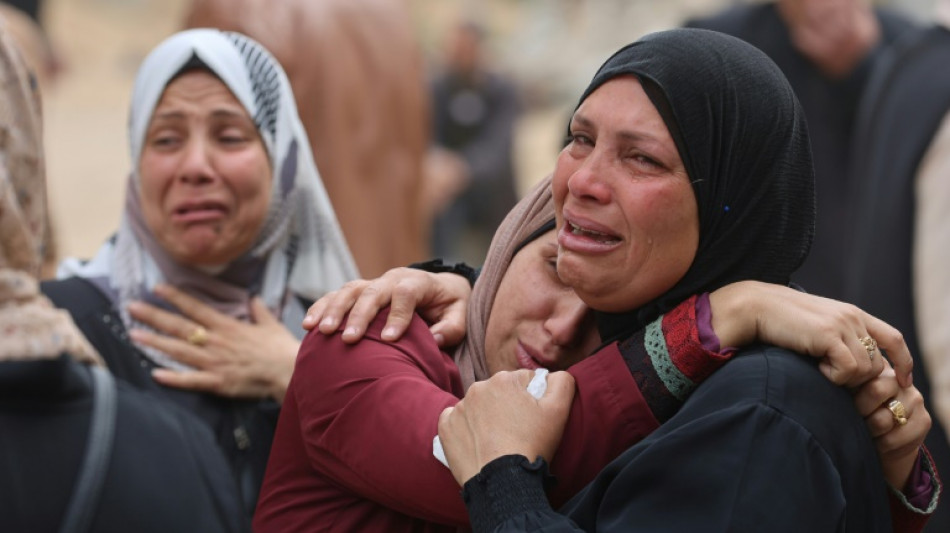Gaza's civil defence agency on Wednesday said its crew recovered charred bodies from a school-turned-shelter for displaced people, as Israeli strikes killed 17 people in the Hamas-run territory since dawn.
Germany, France and Britain urged Israel to lift its blockade on humanitarian aid entering the besieged territory, which it imposed on March 2.
Israel resumed its military campaign in Gaza on March 18, bringing an end to the ceasefire that had largely paused hostilities and resulted in the release of 33 hostages from Gaza and approximately 1,800 Palestinian prisoners from Israeli jails.
Talks aimed at reaching a new ceasefire have so far failed to produce any breakthroughs, and a Hamas delegation is currently in Cairo for renewed negotiations with Egyptian and Qatari mediators.
"Seventeen people have been killed since dawn," civil defence spokesman Mahmud Bassal told AFP, as Israel pounded the war-battered territory.
He said 11 of the victims, who included women and children, died in an air strike targeting the Yafa school building in Gaza City's Al-Tuffah neighbourhood.
"The school was housing displaced people. The bombing sparked a massive blaze, and several charred bodies have since been recovered," he said.
Several bodies, wrapped in white shrouds, were laid at the morgue of Al-Shifa hospital, an AFP journalist reported. The wounded were also being treated at the facility.
At the hospital, women were seen weeping over the body of a child wrapped in a white shroud.
Grieving relatives carried the bodies of their loved ones for burial, including those of children while women wept nearby.
"We want nothing more than for the war to end, so we can live like people in the rest of the world," said Walid al-Najjar, a resident of Khan Yunis after a strike in the area.
"We are a people who are poor, devastated -- our lives are lost."
- 'No tools' to retrieve bodies -
Since the war began following Hamas's October 7, 2023, attack on Israel, tens of thousands of displaced Gazans have sought refuge in schools to escape the violence.
Aid agencies estimate that the vast majority of Gaza's 2.4 million residents have been displaced at least once since the war began.
"We lack the necessary tools and equipment to carry out effective rescue operations or recover the bodies of martyrs," Bassal said.
On Tuesday, the Israeli military stated that it had targeted approximately 40 "engineering vehicles", alleging they were being used for "terror purposes".
Bassal said air strikes destroyed bulldozers and other equipment needed to "clear debris and recover the bodies of martyrs from beneath the rubble", as well as to "save lives, pull people from the rubble".
Elsewhere in Gaza, additional fatalities were reported on Wednesday, including four people killed in Israeli shelling of homes in eastern Gaza City, according to Bassal.
The Israeli military did not immediately comment on the latest strikes.
Since Israel's military campaign resumed, at least 1,890 people have been killed in Gaza, bringing the total death toll since the war erupted to at least 51,266, according to the health ministry in Hamas-run Gaza.
Hamas's attack on Israel in 2023 that ignited the war resulted in the deaths of 1,218 people on the Israeli side, mostly civilians, according to an AFP tally based on official Israeli figures.
- Call to lift aid blockade -
Germany, France, and Britain on Wednesday called on Israel to stop blocking humanitarian aid into Gaza, warning of "an acute risk of starvation, epidemic disease and death".
"This must end," their foreign ministers said in a joint statement.
"We urge Israel to immediately restart a rapid and unimpeded flow of humanitarian aid to Gaza in order to meet the needs of all civilians."
The UN also warned that many community kitchens that are providing food for displaced people are also shutting due to depleting stocks.
"Due to a lack of cooking gas, families are resorting to burning plastic to cook their meals," the UN's humanitarian agency OCHA said on Tuesday.
"There are modest quantities (of fuel) available in Rafah and the north of Gaza, but they cannot be accessed due to displacement orders and location in the 'no-go' zones" drawn by the military.
The Israeli military says it is in control of 30 percent of Gaza, but AFP calculations based on maps given by the military show Israeli forces controlling more than 50 percent of the territory.
B.Francois--LCdB
